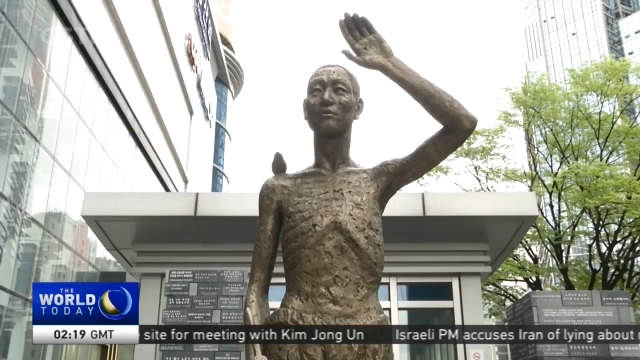
10:42, 01-May-2018
Labor Day in ROK: Civic groups to erect statue for 20th century forced labor
02:40

May 1st is Labor Day in many countries, including South Korea. There, the day is not an official public holiday in the country, but many workers still celebrate. This year, civic groups attempt to build a statue in front of the Japanese consulate in the city of Busan. It's to honor those forced to work for Japanese companies during 20th century colonial rule. These groups, however, expect backlash from the South Korean government, which is against the plan. CGTN's Shane Hahm reports.
It's a fight to build a statue, a statue symbolizing Japan's forced labor of South Koreans during colonial rule. Civic groups want to erect it in front of the Japanese consulate in the city of Busan. But the government suggests a different location to avoid any diplomatic fallout.
KIM JAE-HA, HEAD BUSAN MOVEMENT HEADQUARTERS FOR SOCIAL REFORM AND ELIMINATION OF ACCUMULATED ILLS "We believe the foreign ministry's position is speaking on behalf of Japan's position. Much like the comfort women issue, Japan has yet to apologize or compensate for the forced labor issue. This is a present-day problem."
SHANE HAHM SEOUL"This statue was set up last summer in front of this train station in Seoul to honor the victims of forced labor under Japanese colonial rule. Laborers were known to have been herded to this station in the early- to mid-20th century where they would later be distributed to work at Japanese companies."
Hundreds of thousands of Koreans are thought to have been taken to Japan against their will. Some survivors and their relatives have initiated legal action for compensation and await final decisions from the Supreme Court. The foreign ministry understands what's at stake but doesn't want it to affect diplomatic relations.
NOH KYU-DUK SPOKESPERSON, SOUTH KOREAN FOREIGN MINISTRY "Installation of a forced labor statue in front of the Japanese consulate in Busan is inappropriate under international norms and customs related to protecting diplomatic missions. There's a high chance it could lead to diplomatic friction."
Historical issues are a constant thorn in relations between Seoul and Tokyo. For instance, in 2015, the two nations signed a deal to put the comfort women issue to rest. But the current government backtracked on the agreement, saying it is seriously flawed but still decided against renegotiating it.
YANG KEE-HO PROFESSOR, SUNGKONGHOE UNIVERSITY "I think it's important for citizens and civic groups from both countries to show restraint and make mature judgments to prevent bilateral discord from deepening."
The gaunt laborer with a pickax is a reminder to passers-by of Japan's wartime actions. Victims say they will continue their fight for just compensation and a formal apology. Shane hahm, CGTN, Seoul.

SITEMAP
Copyright © 2018 CGTN. Beijing ICP prepared NO.16065310-3
Copyright © 2018 CGTN. Beijing ICP prepared NO.16065310-3